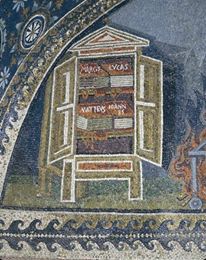20 August OS 2022 – Friday of the 12th Week of Matthew; Holy Prophet Samuel
You can listen to an audio podcast of this blog post at https://www.spreaker.com/user/youngfaithradio/matt12mon
This past Monday we began reading from the Gospel According to St. Mark, the shortest and most direct of the four Gospels. St. Mark, the disciple of St. Peter, wrote his Gospel for the Church at Rome, and the terse and concise character of the Gospel corresponds to the old Roman character: sober, no-nonsense, and to the point. St. Mark’s Gospel emphasizes the actions of Christ: One goes rapidly from one event to another, one miracle to another, right up to the climactic chapters twelve, thirteen, and fourteen, which recount Our Lord’s Passion and Resurrection. Some of the Lord’s oral teachings, given to edify us and call us to obedience, are given as well, but the overwhelming impression one receives from reading this Gospel, especially if one will set aside time to read it aloud from start to finish, is that of His active divine power, destroying the reign of Satan and bringing the Kingdom of God into the world.
St. Mark’s brevity brings into relief a fact about all the Gospels: They are not biographies of Jesus Christ, but rather a proclamation of Who He is. They contain only what we need to know, to believe, and to do in order to find salvation. We must read and hear these words – physically and mentally read and hear them, while struggling for attention – make an act of faith in their truth, pray for understanding, and resolve to live according to their demands, both those explicitly taught by Christ in words and those implied by His actions. This must happen day after day, or we forget what a Christian is.
If we have been slack in reading the Gospel lately, this new beginning, with the shortest Gospel, is a good place to start again. We need to open the Gospel, stand or kneel in front of our icons, and read aloud the daily assigned passage or perhaps a whole chapter, going chapter by chapter day by day. Read aloud, at a moderate pace. Struggle for attention. The words of the Gospel are infused with the infinite divine power of the Holy Spirit, and they are self-acting. If we read them with the struggle for attention, they will bring about spiritual fruits.
This actual reading of the Gospel is the most important and first step, and the Holy Spirit will grant us understanding, if only we ask for it. If we desire to take another step and study the Gospels as well as read them, we should use a patristic or patristically inspired commentary. The commentaries of the ancient Fathers, pre-eminently St. John Chrysostom, are the most complete, but most of us need something shorter: the normative short commentary is the explanation of the Gospels by St. Theophylact of Ochrid. This essential Orthodox reading was made available in English, in four volumes, from Chrysostom Press in House Springs, Missouri, some time ago, though it is now being published and sold by St. Herman Press. You can find it here: https://www.sainthermanmonastery.com/category-s/1896.htm
Besides, or along with, St. Theophylact, the best guide to the Gospels for our time is the commentary by Archbishop Averky, available from Holy Trinity Monastery at http://bookstore.jordanville.org/9781942699002. Just reading a page every day from one or both of these commentaries will change us greatly for the good.
Today, 20 August/2 September 2022 marks the 40th anniversary of the repose of Hieromonk Seraphim (Rose). One of Fr. Seraphim’s “quotable quotes” was, famously, “We know they are Orthodox, but are they Christians?” Of course, he did not mean that being Orthodox and being Christian are really two separate things: being Orthodox assumes being a Christian, and to be a Christian in the most accurate sense, to be in the Church, one must be Orthodox. He was using irony to make a point, that one can be taken up with the various aspects of the Faith that manifest the Gospel and forget the Gospel itself. If one’s mind is not immersed in the Gospels, and if one is not submitted in obedience to the commandments of the Gospels, then the canons, hierarchical structures, church buildings, liturgical services, liturgical arts, domestic customs – the various manifestations of Church life – easily become idols, ends in themselves. Our understanding of them becomes fragmented, alienated from their true meaning and their coherence, and their purpose, in the light of the Gospel, and instead of using them as instruments for our salvation, we misunderstand and misuse them in such a way that their power – which is indeed great, whether to salvation or damnation – transforms us into Sadducees and Pharisees. Sadducees worship the liturgical cult and the church organization. Pharisees worship rules and outward piety. Christians worship the Holy Trinity.
Bishop Ignaty Brianchaninov writes in The Arena that we will be judged, both at the particular judgment following death and at the general judgment at the Second Coming, according to the commandments of the Gospel. This judgment shall determine our fate for all eternity. Let each of us hasten to make himself most intimate with the book by which he will be judged, and compare to it daily and continually that other book which shall be opened at the Judgment, the book of his heart.

